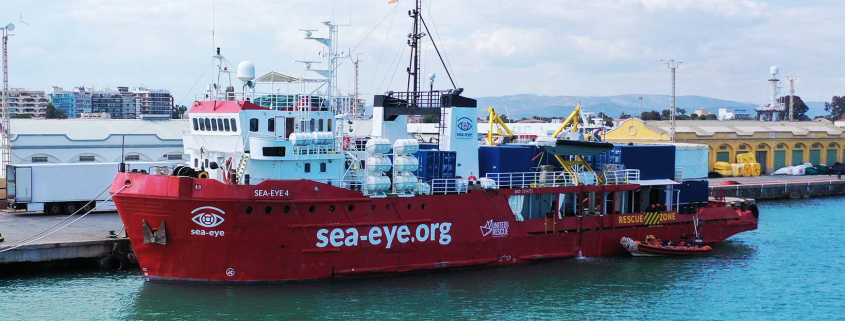Sea-Eye asks German Foreign Minister Baerbock and the German Foreign Office for help
Sea rescuers warn that all rescue ships could be detained
On Sunday afternoon, the sea rescue organization Sea-Eye appealed to the German Foreign Minister Annalena Baerbock and the German Foreign Office with an urgent request for help. Previously, the Italian authorities had detained the German rescue ships SEA-EYE 4 of Sea-Eye and MARE*GO of Zusammenland.
Both vessels rescued a total of 86 people seeking protection from unseaworthy boats last week. In both cases, the vessels were each punished with 20 days of administrative detention. The SEA-EYE 4 is accused of interrupting its approach to Ortona, the port of disembarkation assigned by Italian authorities, to rescue more people from distress at sea instead of maintaining its course as requested.
“We cannot ignore distress calls. That’s why we changed course,” said Gorden Isler, chairman of Sea-Eye e. V.
In case of repetition, the sea rescuers face even harsher penalties. Should the SEA-EYE 4 again carry out further rescues on a future mission, although the Italian Maritime Rescue Coordination Center has already assigned a port of disembarkation, high fines and a further detention for up to six months can be imposed. In the event of a further repetition, a rescue ship should then even be able to be detained indefinitely according to the new Italian law of 24.02.2023.
“This law could completely shut down civilian sea rescue if the Italian authorities continue to apply it in this way. After all, we will not ignore distress calls to prevent detentions. To put us in front of this choice is inhumane and irresponsible,” Isler continues.
In a message to German Foreign Minister Baerbock and the German Foreign Office, Sea-Eye asked that they work to ensure that
1. civilian rescue ships are not detained for having conducted multiple rescue missions,
2. the detentions of the SEA-EYE 4 and MARE*GO lifted and to refrain from fines,
3. civilian rescue ships are used optimally by Italian and Maltese authorities to save as many lives as possible,
4. the donation-funded resources of civilian sea rescue organizations are not wasted by sending ships to faraway ports in order to reduce their operating time in the Libyan and Maltese search and rescue zone and
5. the Maltese rescue coordination center resumes its coordination duties for fleeing people in distress at sea in order to avoid further fatalities.
“We have now reached a point where it is still possible to prevent all civilian rescue ships from being detained for longer periods of time in a few months because of too many rescue operations,” the message to the German Foreign Office concludes.
Sea-Eye will appeal the assessment decision. The organization has 60 days to do so. However, a quick decision is unlikely, as proceedings before Italian administrative courts are complex and lengthy.



